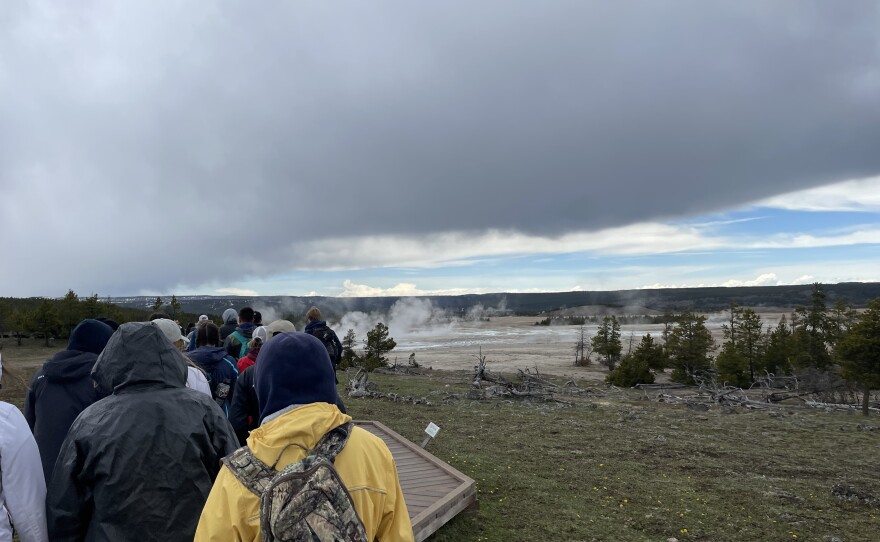Students chatter with excitement at a rest stop in West Yellowstone just before entering Yellowstone National Park. The class from Belgrade wants to unwind after taking their AP tests.
“Several of us took more than one,” one student explains. “So we’re just, like, a little oof."
The students are in Kim Popham’s AP biology class at Belgrade High School. Popham started taking her students to Yellowstone in 2010. While most classes have official tour guides, Popham’s class can rely on her past experience as a researcher at the park.
“It’s so funny because when I went to the school board to ask them if I could take this trip they were like ‘well are you hiring somebody?’” Popham says. “And I was just like, ‘no, I did this for a living for four summers. I’m just gonna do it myself.’”
Popham leads her class through the park, explaining the different types of thermal features in the park, how they function, even how they sound.

“It changes all the time,” Popham says. “The mud pots are very bloopy, I always say they’re very bloopy. Because you have some gas that’s coming up from the mud and it makes a cool sound. And then the fumarole is just like a gas jet."
Yellowstone National Park provides a unique learning opportunity for kids who grow up with the more than two million-acre park in their backyard. But past the educational benefits, students have the chance to connect with nature, which Belgrade High School counselor Andy Hessen says is particularly important in the aftermath of the pandemic.
“It’s no secret, right, the whole world is talking about the mental health of our kids,” Hessen says. “It’s been a hard couple of years. Put kids who live in Montana more indoors and encourage them to be a little more isolated.
"It’s just not a good recipe for being happy.”
According to the American Psychology Association, studies about how nature impacts children’s mental health began in the 1980s. Since then, research about the relationship between the natural world and children’s mental well-being suggests that connecting with nature improves resilience to stress and adversity.
“The goofy side of me sees the laughter and the enjoyment that our kids get,” Hessen says. “So I’m always looking for where my kids are getting enjoyment from. From anything really.
"To see them get enjoyment out of something I really enjoy as well, the outdoors and being in the natural world, it’s really great and I think it’s pretty darn helpful to a lot of them.”
For students who aren’t lucky enough to have a former Yellowstone researcher as a teacher, the park offers learning resources for children. Bob Fuhrmann coordinates the educational programs offered by Yellowstone National Park including distance learning, field trips and the Youth Conservation Corps.
“Having this wide spectrum of programs allows us to either offer that program in their classroom,” Fuhrmann says. “Or if they’re able to be able to come to the park they can come for just a day and have a couple hour program by a ranger in the park. Or if they’re able to spend multiple days, then the schools that are able to do that can come and really immerse themselves in Yellowstone.”
Fuhrmann says he’s seen the most emotional growth among students who participate in the conservation corps. The month-long program gives 15- to 18-year-olds experience working in the national park.
“Students who might have trouble in the classroom excel in the outdoors many times,” Fuhrmann says. “So giving them a chance to excel and feel good and build their confidence about themselves really is great.
"That’s not what we’re teaching. That’s just what this place is able to teach.”

For Popham’s students, a trip to Yellowstone National Park is just as much about recreation as it is about education.
“I ask a lot of these guys, and they rise to the occasion and they kill it. They do so much work for me," she says. "And it’s just fun to see them laugh and relax and have fun and realize how much they actually learned.”




